 MyDogBreeds
MyDogBreeds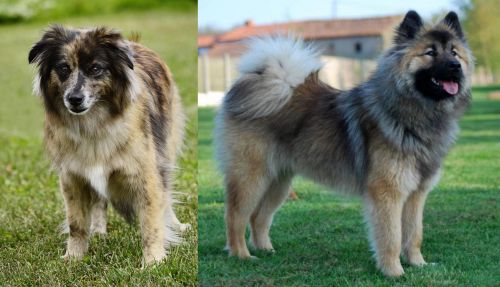 Pyrenean Shepherd is originated from Spain but Eurasier is originated from Germany. Pyrenean Shepherd may grow 10 cm / 3 inches shorter than Eurasier. Pyrenean Shepherd may weigh 12 kg / 26 pounds lesser than Eurasier. Both Pyrenean Shepherd and Eurasier has almost same life span. Pyrenean Shepherd may have less litter size than Eurasier. Both Pyrenean Shepherd and Eurasier requires Moderate maintenance.
Pyrenean Shepherd is originated from Spain but Eurasier is originated from Germany. Pyrenean Shepherd may grow 10 cm / 3 inches shorter than Eurasier. Pyrenean Shepherd may weigh 12 kg / 26 pounds lesser than Eurasier. Both Pyrenean Shepherd and Eurasier has almost same life span. Pyrenean Shepherd may have less litter size than Eurasier. Both Pyrenean Shepherd and Eurasier requires Moderate maintenance.
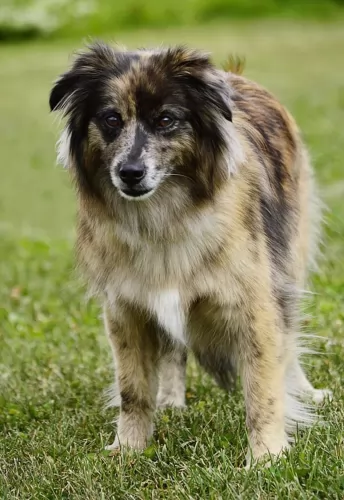 The Pyrenean Shepherd hails from Spain where he has always been used to herd sheep. Some people believe he is a descendant of the French Catalan Sheepdog while others say from the Briard. Nobody is too sure.
The Pyrenean Shepherd hails from Spain where he has always been used to herd sheep. Some people believe he is a descendant of the French Catalan Sheepdog while others say from the Briard. Nobody is too sure.
He is actually the smallest of the French herding breeds. It is interesting to note that he still does this herding job today. It was in the 19th century that a few of these dogs left for America with shepherds who found work herding flocks in the American West.
These dogs were also used in World War 1 as messenger dogs.
It was during the 1970's and 1980's that breeding programs were started for the dog and The Pyrenean Shepherd Club of America was formed in 1987. The dog was also recognized in 2009 by the American Kennel Club.
 The Eurasier is a dog which hails from Germany and is a cross between the Wolf Spitz, the Chow Chow and the Samoyed.
The Eurasier is a dog which hails from Germany and is a cross between the Wolf Spitz, the Chow Chow and the Samoyed.
The puppies of the dog could reproduce themselves, so that a new breed was recognized by the German Kennel Club as well as the Federation Cynologique Internationale.
It is believed that the name was chosen as a referral to the dog’s European and Asian background. Today the Eurasier is found in most European Union countries as well as in Canada and the United States, but still the breed’s population is low, with efforts in place to raise its numbers.
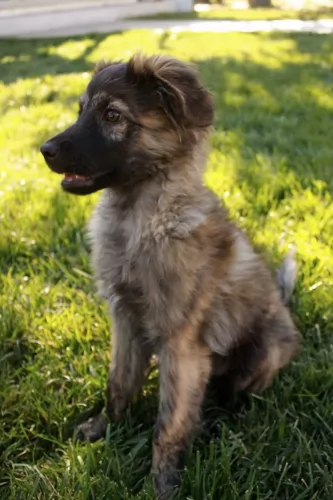 The Pyrenean Shepherd is a medium-sized dog standing at between 38 and 50cm in height and weighing between 14 and 20kg.
The Pyrenean Shepherd is a medium-sized dog standing at between 38 and 50cm in height and weighing between 14 and 20kg.
His head is fairly small with large, bright, expressive eyes. The ears are semi-erect. The tail has always traditionally been docked but often left long these days.
He comes with two different coat types – rough and smooth with sometimes both types being in the same litter. The dog is a regular shedder. The coat can be medium length or long and slightly wavy with a harsh texture. The coat can be of the shorter type with finer, softer hair. The coat is available in different colors and patterns, and can be a fawn color or grey and you will find a black overlay occasionally with some white. The coat can be tri-colored or he can be in solid colors such as cream or white.
Your feisty Pyrenean Shepherd is a dog with plenty of personality. He is also full of energy and will love to live with a outdoorsy-type family who are always on the go, because he’s in on everything.
He is distrustful of strangers and this together with the fact that he is so alert, makes him a splendid watchdog too.
He will need to be trained and socialized as he can be overly robust. He becomes obedient and well mannered, being totally dedicated to his owner. It isn’t easy for him to be separated from his beloved human owner.
 The Eurasier is a medium-sized dog, standing at roughly 48cm to 60cm in height and weighing 18kg to 32kg. He has a medium to long length coat in a range of different colors – fawn, black and tan as well as a mix of colors such as silver and black.
The Eurasier is a medium-sized dog, standing at roughly 48cm to 60cm in height and weighing 18kg to 32kg. He has a medium to long length coat in a range of different colors – fawn, black and tan as well as a mix of colors such as silver and black.
He has medium-sized, erect ears and the tail is always held over the back. The nose is black and the eyes are also medium in size and dark and should never be obscured by the dog’s hair.
Confident while being reserved around strangers, the calm Eurasier isn’t an aggressive dog.Bred as a companion animal, he is tolerant of other pets in the house as well as with children, and having him socialized and trained will ensure that he is obedient, relaxed and amicable. He is an intelligent dog and responds well to training.
He loves to be with his human family and will adapt happily to city- or country life. He doesn’t have high activity levels so daily walks and ball games will be sufficient for him.
He isn’t the kind of dog that you can keep in your backyard as a watchdog and then just neglect him. He’ll become bored and destructive through no fault of his own.
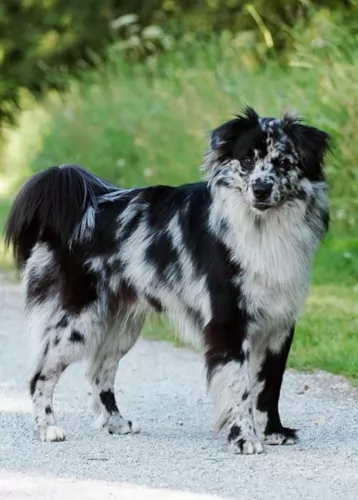 The Pyrenean Shepherd is essentially a one-person dog, becoming totally attached to one particular person in the family.
The Pyrenean Shepherd is essentially a one-person dog, becoming totally attached to one particular person in the family.
He is known as a dog who becomes totally loyal to his human family, getting on well with children as well as with other pets in the home.
He is aloof and wary of strangers. Training and socialization is important so as to avoid aggression and fear. This is one dog that requires being diligently exercised every day.
He is a great watchdog, and when you add up all his fantastic qualities, you get to realize what a splendid companion and pet this wonderful dog makes.
 You can just see on the face of the Eurasier that he is a loving, gentle dog who wants to be part of a loving human family.
You can just see on the face of the Eurasier that he is a loving, gentle dog who wants to be part of a loving human family.
As a companion dog he makes a splendidly devoted and loyal pet, wanting to be involved in everything his human ‘pack members’ are doing. He is healthy, intelligent, playful and loving and when you invest in such a pet, you’re investing in a close, loving relationship for many years.
 The Pyrenean Shepherd is such a jovial little dog that you just can’t imagine him ever being sick. When he is lethargic, you'll know there is something seriously wrong with him because he is always as bright as a button.
The Pyrenean Shepherd is such a jovial little dog that you just can’t imagine him ever being sick. When he is lethargic, you'll know there is something seriously wrong with him because he is always as bright as a button.
He can however get sick, and there are a few dog illnesses such as epilepsy, eye problems and hip dysplasia that can be very painful ad debilitating for such an energetic dog. You don’t have to be too concerned though, as he is a dog known to have minimal health issues.
 To a large extent, we have the health of our pets in our hands. The way we treat them – the food we give, the activities he takes part in, his sleeping facilities and the attention we give him all contribute to whether he will be healthy or not.
To a large extent, we have the health of our pets in our hands. The way we treat them – the food we give, the activities he takes part in, his sleeping facilities and the attention we give him all contribute to whether he will be healthy or not.
Nonetheless there are dogs who enjoy the best life and yet they still get sick. The Eurasier is a healthy dog breed who can push 12, 13 or 14 years, but still there are some common dog diseases to look out for.
Problems which are of concern are hip- and elbow dysplasia and patellar Luxation. Patellar luxation is when the dog's kneecap becomes dislocated and you see your pet holding up his hind leg for a while. These dislocated kneecaps are quite common in dogs and can lead to arthritis and even lameness.
Your vet can diagnose this problem through different means to help your pet.
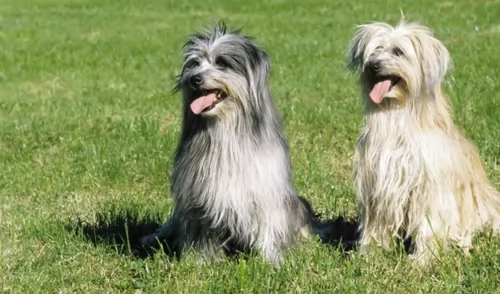 This will depend on the coat type. Both coat types will essentially require you brushing him twice a week.
This will depend on the coat type. Both coat types will essentially require you brushing him twice a week.
The Pyr Shep’s activity levels are very high and this dog will require living with people who love outdoor activities. He’s the perfect companion for those camping trips or hikes. He is always ready to join you on your walks and will be ready and waiting to jump right in when he sees you with a ball or frisbee.
For all that energy, your Pyrenean Shepherd will be needing the best dog food there is. Food full of preservatives and colorants can be bad for your pet, detrimental to his health.
Good food full of vitamins and minerals will ensure your pet stands a good chance of living a long, healthy life. If you feed him commercially manufactured dog food, ensure its the best there is, with labeling on the packaging that tells you its for his age, his size and energy levels.
Consistency and simplicity is what your Pyrenean Shepherd wants, and home-made food can enhance his dry kibble. Boiled chicken, brown rice or pasta and spinach, sweet potatoes and carrots all chopped up and mixed into the dry kibble once or twice a week will ensure your pet’s eyes are continuously bright and alert and his tail constantly wagging.
Some raw meat added in occasionally will also go towards ensuring his good health. Always make sure he has access to fresh, cool water.
 The Eurasier, just like any other dog, requires high quality food. Luckily, as far as convenience goes, there are some excellent commercially manufactured foods, but you still need to check out the ingredients on the packaging as you want to avoid some of the dog foods high in chemicals and fillers.
The Eurasier, just like any other dog, requires high quality food. Luckily, as far as convenience goes, there are some excellent commercially manufactured foods, but you still need to check out the ingredients on the packaging as you want to avoid some of the dog foods high in chemicals and fillers.
The best pet foods are the ones that are high in protein, and meat sources such as chicken, beef or salmon for instance should show up among the top 5 ingredients.
Your Eurasier won’t want to eat kibble every day of his life so add in your own homemade cooked brown rice, vegetables and chicken from time to time. Also, every now and again, it will be of tremendous value to your pet’s immune system to include some raw meat.
Brush your Eurasier twice a week to keep his coat shiny and healthy. Grooming your pet has a number of benefits apart from making him look good. It infuses him with a healthy glow – he literally glows with a sense of wellbeing and confidence because you care for him.
The benefits of brushing your pet include better blood circulation and a shinier, healthier coat. Also check your dog’s nails, check his ears inside and out and make sure to attend to his teeth 2 or 3x a week. There are special toothbrush and toothpaste designed specifically for dogs.